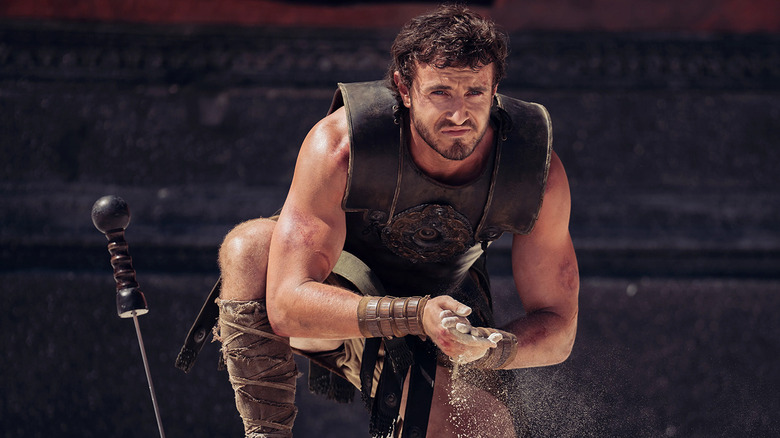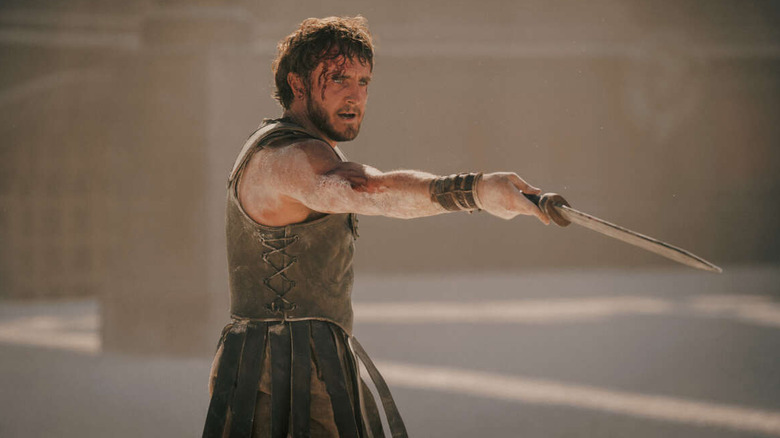The Most Disappointing Part Of Gladiator II Is Truly Baffling
After the original "Gladiator" was released in 2000, the story of a Roman General forced to become a slave and a gladiator in the Colosseum went on to take the Academy Awards by storm. It earned a whopping 12 nominations, and it went on to win the Oscars for Best Picture and Best Actor for Russell Crowe, as well as Best Costume Design, Best Sound, and Best Visual Effects. But there's one key piece of "Gladiator" that didn't take home the trophy, despite being nominated: Hans Zimmer's incredible original score, which lost out to Tan Dun's soundtrack for "Crouching Tiger, Hidden Dragon."
Despite not winning the Oscar, "Gladiator" would become one of the most influential scores in cinema at the time. So many movies tried to replicate the power of Hans Zimmer's beautiful, triumphant, and magnificent music. In particular, the theme that emerges early on in the film's action-packed opening battle sequence is one of the most respected pieces of cinematic music of the 21st century. Waiting to charge within the track titled "The Battle," Zimmer has a pair of truly epic themes that help make General Maximus (Russell Crowe) look like the kind of Roman hero who deserves to have sculptures and paintings made of his conquests.
The first theme begins around the two-minute mark, where a crescendo begins that leads to one of the brass-fueled themes that has horns blaring in attack. Later in "The Battle," around the 5:52 mark, we get the second theme that really feels like a battle charge composition. These two themes are so epic that they're brought back into play later in the movie when Maximus and the rest of his gladiator cohorts are forced to face the barbarian horde. You can hear them much closer in proximity to each other in the aptly titled track "Barbarian Horde" starting 4:43.
Why am I getting so hyper-specific with these themes from "Gladiator," you might be wondering. Well, it's because "Gladiator II" makes the unfortunate mistake of not referring back to these themes in any capacity.
The score for Gladiator II is fine, but it could have been great
The sequel's score by Harry Gregson-Williams, who worked with Ridley Scott before on "Kingdom of Heaven" and "The Martian," is a perfectly fine composition. But it pales in comparison to what Hans Zimmer gave us back in 2000, and it makes me wish the composer hadn't opted out of returning. What's truly baffling is that the score isn't entirely resistant to alluding to themes from the previous film, but it's only the more quiet, flute-oriented cues that are utilized in moments of emotion with Lucilla (Connie Nielsen) and scenes of intrigue in attempting to overthrow Emperor Geta (Joseph Quinn) and Emperor Caracalla (Fred Hechinger).
While I'm sure that a more close listen to the "Gladiator II" score will make it clear that Paul Mescal's character Lucius has his own theme, it feels like a missed opportunity to not bring back the aforementioned battle themes when he takes charge in the gladiator games of the Colosseum. It's especially strange when you see just how hard this movie is pushing the specter of Russell Crowe's Maximus upon Lucius, positioning him as the second coming of the rebel gladiator who tried to free Rome so many years ago. Why wouldn't you use Hans Zimmer's invigorating music for at least one moment in a tribute to Maximus?
Unlike the original "Gladiator" score, the sequel's soundtrack simply doesn't have any breakout moments that make the same mark that Hans Zimmer did nearly a quarter-century ago. Obviously, it's a tall order to measure up tone of the most legendary composers still working today, but incorporating Zimmer's music certainly would have helped, especially if Gregson-Williams used it as a gateway into a new theme for Lucius. Perhaps Ridley Scott can right this wrong with the potential "Gladiator 3" that may already be in the works.

